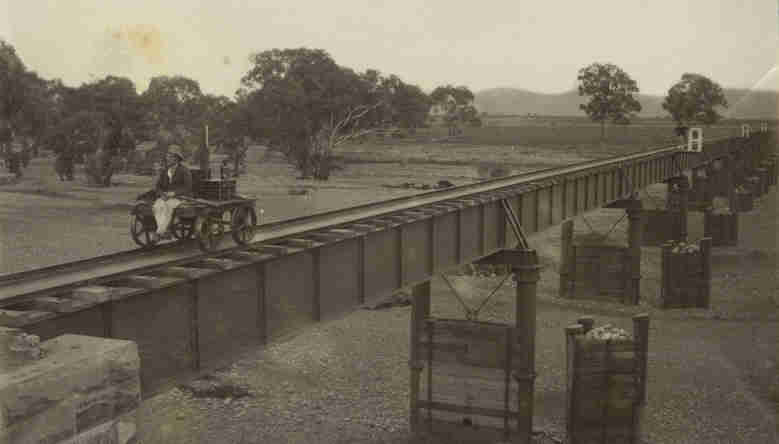|
Early days at Hookina
The 1870s.
Hookina Bridge on the Great Northern Railway in the Flinders Ranges.
It was the longest bridge on that line. SLSA PRG 742/5/37
Although 1871 started with a few problems, the 1870s turned out much better than the previous decade. In January the Overland Telegraph construction camps had to put up with heavy storms and during one of them the cook was blown away followed by his oven, kettles and tin dishes. Two weeks later Walter Payne fell off a bullock dray, containing a load of telegraph wire. The wheel passed over his arm and foot fracturing both of them. He was taken to the Hookina hotel where William Taylor rendered first aid. Dr Cotter was summoned but he was unable to do anything. Payne died a few days later.
Early February came with more rain but it was really too late in the season to have any benefits. The teamsters though were still doing very well supplying the construction parties along the line. March brought more rain resulting in creeks running a banker. Immense gum trees were lodged in the branches of others to a height of 18 feet. During that month N Bennett was appointed the new Pound Keeper and he had plenty of work.
During April the weather was much better and even very pleasant at times. Some of the local Aborigines were very troublesome, robbing shepherds huts and in one case even assaulting a shepherds wife. Rats also were a big problem, eating anything and everything they could get. Many fell down the well making the water undrinkable. This lasted well into June. There was still the occasional rain but not enough to do good or bad. Lambing was almost finished and it proved a splendid season.
On 14 July 1871 the Rev. Rowe called in from Blinman and held service at the Hookina Hotel as there was as yet no church building. Almost all the locals attended. They hadnt seen a church person for at least six months. The next service was delivered by Mr Styles of Port Augusta on 28 November. The Rev. Rowe didnt visit again until 23 February 1872.
By December 1871 traffic on the road and through Hookina was minimal due to the heath and the finish of the wool season. For most of the 1870s it was the teamsters and cameleers who used the old copper route which kept Hookina alive. It was also hot and dry but that didnt stop anybody from having a good time at the New Years Eve ball at Taylors Hotel.
January was hot and oppressive but some of the creeks were still running. February was the same; unbearably hot.
On 6 February 1872 Rices Variety Troop visited Hookina and gave an entertainment at the hotel. It had been organised by Taylor who would have made some financial arrangements as the small population of the town would not have covered the expenses. It must have worked to everyones satisfaction as four months later, on 13 June, the Star Variety Company treated the locals with another entertainment at the hotel.
Despite the excessive heat the country was still looking well after some intermittent widespread rains. Slowly but surely traffic was getting brisk with loading for the Overland Telegraph Line. Early May one of the telegraph wiring parties stopped at Hookina on their way home to Adelaide after having been up north for up to 18 months.
In August an eight-ton boiler for the Sliding Rock mine left Hookina after being stuck on the wet and muddy road for a fortnight.
The boiler had come from Port Augusta winding its tracks slowly through the Pichi Richi Pass and over torturous tracks. At Hookina it was marooned and four more bullocks had to be yoked to continue the journey. It arrived at Sliding Rock on 15 August, pulled by 20 bullocks, nearly four months and 260 km after its arrival at Port Augusta.
During that same month a mob of cattle belonging to EM Bagot passed the town for the far north. In 1872 there were a few changes and mishaps at Hookina. Alexander Wyly was the Postmaster and newspaper agent. His wife Ann had another daughter on 22 March and the weather remained pleasant. George Fruerbach died on 1 February near Hookina on his way to Port Augusta seeking medical treatment. In November Angus McLeod made it known that he owed nothing to Mr Thompson of Arkaba and William Taylor donated a horse to J Carroll who had lost a valuable team. The locals donated 48 towards its repla cement.
By the early seventies the population at Hookina was still small but increased a little when William Taylors wife had a daughter on 18 April 1873. David Tulloch started as a carpenter. Alexander Wyly was now a storekeeper, Charles Kite teamster, George Kite pound keeper and James Finn blacksmith. During April G Price, a colporteur for the British and Foreign Bible Society, had a very successful trip to Hookina and Beltana.
In 1874 William Taylor, the publican of the Hookina Hotel, employed a half-cast Aborigine and Alexander Wyly the postmaster now earned 9 per annum. His job was not too time-consuming as only 56 letters were delivered at his post office. On 25 January 1875 a sharp and violent earthquake shook all the buildings in town for almost a whole minute.
In 1875 Dorothea Vogelsang took ill at the Killalpaninna Mission and Father Vogelsang took her, and their son Heinrich, in one of the German wagons down south for medical aid.
After having travelled more than three hundred kilometres her condition deteriorated near Hookina. Vogelsang tied his son to the wagon and hurriedly left for nearby Hookina for help. She died on 8 April 1875 before his return and was buried at Hookina. Heinrich was left with Pastor J.G. Rechner and his wife at Light Pass. When Vogelsang arrived back at Killalpaninna he found his house gone up in flames.
Once again there was some talk about a railway from Port Augusta via Pichi Richi Pass, Willochra, Hookina, Parachilna and Beltana. But it was slow in coming. At the August land sales in Adelaide, Haywood, GW Cotter and W Taylor bought several blocks each at Wirrabara. During 1876 business was improving and in September Taylor wanted a steady wheelwright offering constant work for any length of time. Charles Kite was still employed as a teamster and George Kite was the pound keeper.
On 18 September A McLeod wrote to the Chamber of Manufacturing asking about information on the growing of tobacco. The secretary forwarded a copy of the papers and would ask Dr Schomburgk for any further particulars relevant to its cultivation. George H Tooth was killed after falling from his horse. He died at Hookina on 8 July 1877 aged 45, a stockman of Mundowdna Station, leaving a wife and four young children.
In 1878 William Taylor transferred his publicans licence to William Finn. He had done well and now had a large hotel built in Port Augusta and leased the Hookina hotel. A year later he built a brewery at Pichi Richi. The family suffered another loss when their son Edward John Tamblin Taylor, aged 4 months and 15 days died of inflammation on 11 January 1878.
Although the population was still small there were some characters among them who were not exactly an asset to the place. In October they made headlines in the papers for all the wrong reasons. One of them had this to say;
BRUTAL ASSAULT ON TWO CHINAMEN.
Two men, named Edward Lecky and W. Pelton were brought before Messrs. E. Gower, S.M., and T. McTurk-Gibson, J.P., at the Magistrates' Court, Port Augusta, on Monday, 7 October 1878, charged on remand with an assault upon two Chinamen, Chang Nang and O Yem, at Hookina, on the 24th September last. Mr. L.B. Matthews appeared for the prosecutors. From the evidence of the Chinamen it appeared they had walked from Moralina on the morning in question to Hookina in order to meet the Beltana mail coach, and to go by it to Port Augusta.
While waiting for the coach the prisoners (who had also arrived there that morning) first tried to induce them to drink with them, and then to shout, as it is termed, and then they tried to force them into the bar. The Chinamen struggled with their captors, whereupon another man, threw them down, and kicked and otherwise maltreated them. Pelton then struck them about the head and face, and Lecky got hold of one of them by the shoulders and forced him into the bar. They then called for a glass of brandy, which they said they would compel their victim to drink, but according to the evidence of the barman (Charles Hart) they did not get the brandy, as he refused to let them have it for such a purpose.
In order to carry out the spree they then got a rope and tied it round Chang Nang's neck, he managed to get it off, and they then tied him by the heels to the horse-rail in front of the bar door, with his body resting on the ground. After this they took the other man O Yem and put a rope round his neck, and throwing the end over the lamp iron on the post. Lecky lifted the man up while Pelton hauled on the rope. By this time the coach had arrived at the changing place, a few hundred yards from the public house, which in this case is also the Post Office, and Mr. Barclay, a surveyor, who was a passenger, walked on to the inn, taking the mail-bag with him, and seeing what the men were doing, he interfered, and they let the poor fellow down.
Mr. Barclay, whose evidence fully corroborated that of the Chinamen, said that when he interfered the man was hanging by the rope which was round his neck, his feet were off the ground, and he appeared to be choking. Lecky seems to have taken no further part in this disgraceful affair but Pelton, not content with what had been already done, still continued the ill usage, and when Mr. Conway arrived with the coach he found Pelton still ill-treating the Chinamen, who did not attempt to return the blows.
Mr. Conway enquired from the barman why that sort of conduct was permitted, and was told that he had tried to put a stop to it, and could do no more. He replied, 'Then Ill see whether I can't stop it.' When he came out Pelton had one of the men jammed across the horse-rail, and was beating him about the head. Mr. Conway then went up to him, and told him that he would not stand that sort of thing, and that unless he desisted he would have to deal with him instead of a helpless Chinaman. He then let the Chinaman go, and began using bad language to Mr. Conway, but was prudent enough not to come to blows.
Mr. Mellor spoke at some length on behalf of the prisoners. He said that while everyone must admit that a serious assault had been committed, and that the prisoners deserved punishment for what they had done, he thought the Bench would agree with him that it was merely a drunken lark, totally unjustifiable, of course, but without the slightest felonious intention or evidence of malice. In fact it was shown that the prisoners had no bad feeling towards the Chinamen, whom they wanted to drink with them, and what followed their refusal to drink was merely a very rough sort of practical joke as far as Lecky was concerned, who wanted to frighten and not hurt the men and from the fact that there were several other people there at the time who did not think it necessary to interfere, it was evident that they looked upon it in that light.
It was of course quite natural that the Chinamen, who could but imperfectly understand what was said, should have taken, a somewhat exaggerated view of what took place. He pointed out that very little injury appeared to have been done. Mr. Matthews replied that it was in very bad taste for his learned friend to attack the evidence of the Chinamen, which was corroborated in every respect by the other witnesses, especially by Messrs. Conway and Barclay, and he would say it was a great pity there were not some others there like those two gentlemen, as a more brutal and cowardly crime than that of the prisoners he had seldom heard of, and it was by no means to the credit of the lookers-on that they should have merely protested against such proceedings, and not have interfered in a more active manner.
Had not Conway and Barclay interfered it seemed to him that these unfortunate fellows might have been tortured to death. The S.M. said he had decided to send the case on to the Supreme Court and the prisoners, when asked what they had to say in their defence, both said they should reserve their defence. They were then committed for trial. Mr. Mellor applied for bail to be allowed, but the S.M. said he did not feel justified in allowing bail.
William Martin, the man who was implicated with Lecky and Pelton, was brought up before Messrs. E. Gower, S.M., and O. Wastell, J.P on Wednesday, 9 October. The evidence was substantially the same as that given at the hearing of the case on Monday, and from the testimony of all the witnesses it appears that Martin struck and kicked the two Chinamen in a brutal manner, and also assisted in tying a rope round the neck of one of them, and the heels of the other up to the horse rail. He was committed for trial
 |
By 1879 Hookina had become a major centre of activity. E Kirwan at the hotel was doing a roaring trade, and William Finn blacksmith and wheelwright like wise. In October Berry, Brooks and Frazer badly wanted 50 stonebreakers for their railway contract. They would pay 6 shilling per cubic yard. Apply at Hookina works. In December J MacArthur of Hookina was granted a slaughtering licence making it possible to supply the railway workers with fresh meat. With the coming of the railway both Conway and NA Richardson would have a strong competitor and needed to advertise regularly.
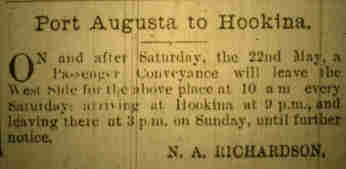 |
With so many men in the different camps surveillance by the police had become necessary and in 1880 a police camp was established at Hookina. On 18 June Jackson Brothers store destroyed by fire. On 22 June PT Anderson left at 11 am on patrol along the railway camps. He returned two days later 24 at 4 pm and reported all quiet along the line. On 24 September MC Carter left for Edeowie to check on reported disturbances amongst shearers. Returned 7 pm; all quiet. On 15 November Carter left for Edeowie Township to check on reported disturbances by navies and to post official correspondence. Among some of the other policemens duties were escorting the paymaster along the line. He was also often needed as a conciliator and arbitrator during strikes.
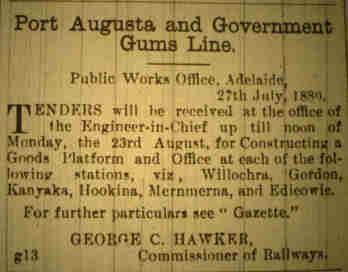 |
During July the government advertised for tenders to construct a goods platform at Hookina. Sadly for the town that would be 5 miles away. A 740 ft bridge would also be needed to cross the creek at Hookina. It would be made up of 9 bays of 60 ft and 10 bays of 20 ft each. On 2 July William Coates Harrison, almost 18 years old, a timekeeper at the GNR fell from one of the trucks and died the next day of his injuries at Port Augusta. An inquest was held with Dennis McConville and William Haney present.
As the platform and main camp were a long way from town, enterprising WG Beauchamp opened a new hotel saving the men a long walk and giving them at the same time also more drinking time.
During November Joseph Simcock who had been storekeeping for a short time moved from Hookina to Quorn but was soon in financial trouble there. On 11 November wife of TT Prisk had a son at the Semaphore and John Chambers of Hookina fined 20 for illegally selling liquor. On 14 November Joseph Iredell and Mary Francis, only daughter of Henry Edwards were married at Hookina. Last but not least on 16 December 1880 government visitors inspected the northern railway and had lunch at Hookina with contractor Brooks.
Hookina Bridge
***
Hookina Cemeteries

If you would like to find out more,


please go
to home page for more information.
Thank you for visiting South Australian History,
We hope you enjoy your stay and find the information useful.
This site has been designed and is maintained by FRR.


| 





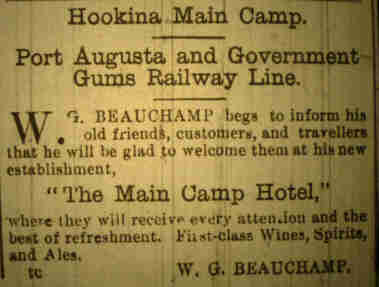
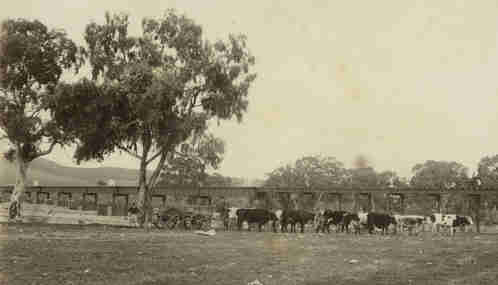
![]()
![]()


